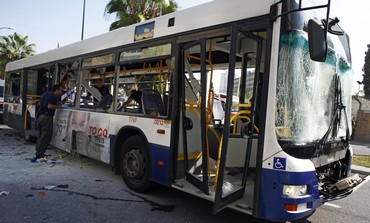UPDATES
Tel Aviv bus bomb terror suspect – a case of “family reunification terrorism”
November 29, 2012 | Sharyn Mittelman

During Israel’s ‘Operation Pillar of Defence’ which was aimed at stopping the rockets being fired into southern Israel from Gaza, Hamas swore retaliation and called for the resurgence of bombings in Israel. Hamas’ military wing, the Al-Qassam Brigades, broadcast on Hamas’ al-Aqsa TV on November 18: “From the Palestinian people to the Zionists: We’ve missed the suicide attacks. Expect us soon at bus stations and in cafés.” Therefore, it was not surprising that Hamas praised the November 21 Tel Aviv bus bombing that injured 28 people, three seriously.
Israel has now arrested suspects responsible for the bus bomb attack, and has released new information on the attack, the Jerusalem Post reported:
“The cell’s members mostly came from Beit Lakia, near Ramallah, the Shin Bet (Israel Security Agency) announced in a statement, without saying how many were under arrest.
During their preliminary interrogation, the cell’s members identified with Hamas and Islamic Jihad and said they had agreed to commit an act of terrorism, prepared the bomb and purchased cellular phones to detonate it by remote control.
They also said one of the cell’s members was from Taiba in Israel. He originally come from Beit Lakia, and acquired Israeli citizenship after marrying an Israeli Arab…
The cell is said to have reached Tel Aviv in a car belonging to an Arab from east Jerusalem who employed the man from Taiba. The latter was in charge of putting the device on the bus, and after he notified his Beit Lakia commander by phone, the bomb was detonated from Beit Lakia.”
Given that a key the suspect is an Israeli-Arab formerly from the West Bank who obtained Israeli citizenship on reunification grounds – he married an Israeli-Arab woman – this terrorist attack has again put the spotlight on how such family reunification laws can be exploited by terrorists to gain entry into Israel to commit their crimes. This man was apparently working with a terrorist cell in the West Bank who both built the bomb and then detonated it, but used this citizen to gain access to the bus in Tel Aviv in order to place their bomb. In other words, without the access this man got as a result of his marriage, this bombing would likely never have occurred.
Yet Israel has often been criticised by human rights groups and media commentators for laws which make it difficult for Palestinians to gain residency after marrying Israeli-Arabs, due to Israel’s security concerns. For example, in May John Lyons wrote an article in the Weekend Australian about the barriers to family reunification for Palestinians, originally titled “Living under the cloud of Israel’s cruel apartheid”, which following complaints was renamed online as “Living under a residency cloud in Israel”.
Lyons told the story of Israeli Arab Taiseer Khatib, who lives in the northern Israeli town of Akko (Acre) and in 2004 married Lana, a Palestinian woman from the West Bank town of Jenin – under a 2003 law Lana cannot become an Israeli citizen and requires a temporary residency visa to stay with her husband in Akko.
AIJAC’s Allon Lee provided a critique of Lyons’ article – see here. Lee noted that Lyons did not explain Israel’s reunification law in its proper context – protecting Israel’s citizens from terrorism during the Second Intifada, nor did Lyons mention that at least 26 Palestinians who had received Israeli citizenship had been involved in terrorist attacks.
What is Israel’s reunification law?
Until 2002 Palestinians who married Israelis were allowed to obtain Israeli citizenship or residency status in accordance with a five-year procedure. During those five years, they were allowed to live in Israel but had to renew their request to remain in Israel each year – and were eligible for full citizenship thereafter.
In 2003, Israel passed the “Citizenship and Entry into Israel Law (Temporary Provision)”. The law aimed to limit the ability of Palestinans who marry Israeli-Arabs to automatically gain entry to Israel. It states that the interior minister is entitled to grant citizenship only if the West Bank applicant has made a strong enough case that he identifies with the State of Israel and that he or his family members have cooperated with Israel or made a contribution to Israel’s security.
The law was amended in 2005 to allow women over 25 and men over 35 who are married to Israelis to request temporary permits to live in Israel, but usually not citizenship.
Petitions have been filed against the law in the Israeli Supreme Court in 2005, 2006, 2007 and 2012 but have all been denied on the basis of its counter-terrorism justification.
While there are many genuine cases of Palestinians seeking reunification for marriage and other reasons, unfortunately it has been demonstrated many times that the process can be exploited by terrorists to gain entry to Israel. This latest attack in Tel Aviv is just the most recent reminder of this unfortunate reality.
Sharyn Mittelman
Tags: Israel





